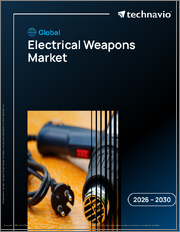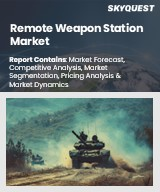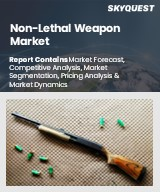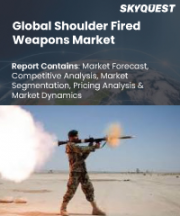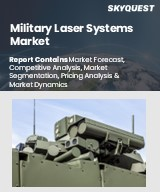
|
시장보고서
상품코드
1831822
원격 조작 무기 스테이션 시장(2025-2035년)Global Remotely Operated Weapon Stations Market 2025-2035 |
||||||
세계의 원격 조작 무기 스테이션 시장 규모는 2025년에 191억 4,000만 달러로 추정되며, 2035년까지 253억 1,000만 달러로 성장할 것으로 예측되고 있으며, 예측 기간인 2025-2035년의 연평균 성장률(CAGR)은 2.83%로 전망되고 있습니다.
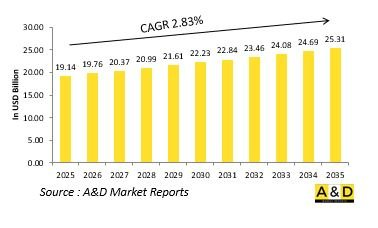
원격 조종 무기 스테이션 시장 소개
국방용 원격 조종 무기 스테이션(ROWS) 시장은 살상력, 정확도, 승무원 보호를 강화함으로써 육해공 플랫폼의 현대화에 매우 중요한 역할을 하고 있습니다. 이러한 시스템은 운영자가 장갑차나 원격지휘센터 내에서 기관총, 유탄발사기, 대포 등의 무기를 제어할 수 있으며, 적의 공격이나 위험한 환경에 노출되는 것을 최소화할 수 있습니다. 장갑차, 순찰선, 고정 시설에 널리 배치되어 다양한 작전 시나리오에서 전투 효과와 상황 인식을 향상시키고 있습니다. 전쟁이 네트워크 중심이 되고 비대칭 위협이 급증함에 따라 모듈식, 확장성, 멀티미션을 지원하는 ROWS에 대한 수요는 지속적으로 증가하고 있습니다. 또한 목표 추적, 주야간 교전, 센서 및 통신 네트워크와의 통합 등 다양한 첨단 기능도 지원합니다. 현대의 국방 전략은 점점 더 자동화와 정밀 교전을 우선시하고 있으며, ROWS는 기존의 유인 무기 시스템과 미래의 자율 전투 플랫폼 사이에 중요한 가교 역할을 할 것입니다. 기존 지휘통제 아키텍처와 통합할 수 있는 능력은 부대의 협력과 임무의 유연성을 더욱 향상시킵니다. 그 결과, ROWS는 현대 국방력의 필수적인 구성 요소로 부상하고 있으며, 정규전 및 비정규전 환경에서 보다 안전하고 효율적이며 즉각적인 전투 작전을 가능하게 하고 있습니다.
원격 조종 무기 스테이션 시장에서 기술의 영향 :
기술의 발전은 원격 조종 무기 스테이션의 능력과 전략적 가치를 크게 변화시키고 있습니다. 첨단 전기 광학 센서와 적외선 센서의 통합으로 표적 감지, 인식 및 추적이 개선되어 운영자가 모든 날씨와 조명 조건에서 더 높은 정확도로 위협과 교전할 수 있습니다. 자동화와 인공지능은 사격 통제 시스템을 강화하여 운영자의 업무 부담을 줄이면서 더 빠른 응답 시간과 반자동 교전 옵션을 가능하게 하고 있습니다. 강화된 안정화 및 반동 관리 시스템은 이동 중 사격 정확도를 향상시키고, 차량 및 해군 플랫폼의 운영 유연성을 확대합니다. 모듈식 설계를 통해 ROWS는 다양한 무기 유형, 페이로드, 임무별 구성에 대응할 수 있습니다. 또한 안전한 통신 링크와 네트워크 지원 아키텍처를 통해 실시간 데이터 공유와 광범위한 명령 및 제어 네트워크에 통합되어 상황 인식 및 협력 작전을 개선할 수 있습니다. 또한 경량 소재와 컴팩트한 디자인으로 무인 지상 차량, 지표 차량 등 다양한 플랫폼에 배치가 가능합니다. 기술의 발전과 함께 완전 자율 무기 스테이션과 AI 보조 타겟팅의 추세는 계속 확대되고 있으며, 미래 전투 시나리오에서 그 역할이 더욱 확대되고 있습니다. 이러한 기술 혁신은 전장에서의 효율성을 높일 뿐만 아니라, 현대전에서 인간의 의사결정과 자동화된 교전의 균형을 재정의하고 있습니다.
원격 제어 무기 스테이션 시장의 주요 추진 요인 :
부대의 안전, 정확한 교전, 작전 효과 강화에 대한 중요성이 강조되면서 전 세계에서 원격 조종 무기 스테이션에 대한 수요가 증가하고 있습니다. 비대칭 위협 증가, 도시전투의 어려움, 신속한 대응 능력의 필요성은 군이 전투의 효율성을 유지하면서 인명피해를 줄이는 시스템을 채택하도록 촉구하고 있습니다. 장갑차와 해군 플랫폼의 현대화는 네트워크 중심 작전에 초점을 맞춘 교리의 진화와 함께 수요를 더욱 촉진하고 있습니다. ROWS의 유연성과 확장성은 대규모 개조 없이 기존 플랫폼에 쉽게 통합할 수 있으며, 정규전과 비정규전 모두에 매력적인 솔루션이 될 수 있습니다. ROWS가 원격 조종 차량에 배치되는 경우가 증가하고 전술적 유용성이 확대됨에 따라 무인 시스템 및 자율 시스템에 대한 관심이 높아지는 것도 중요한 원동력이 되고 있습니다. 또한 지정학적 긴장과 국방비 지출 증가로 인해 각국은 억제력과 전장에서의 즉각적인 대응력을 높이기 위해 첨단 무기 스테이션에 대한 투자를 늘리고 있습니다. 방위산업체와 정부 간의 파트너십은 국내 개발 구상과 함께 기술 혁신과 배치를 가속화하고 있습니다. 이러한 요인들이 결합되어 역동적인 시장 환경을 형성하고 있으며, 진화하는 위협과 임무 요건에 대응하기 위해 모듈식, 생존성, 기술적으로 진보된 무기 스테이션에 대한 요구가 계속 증가하고 있습니다.
원격 조종 무기 스테이션 시장의 지역 동향 :
원격 조종 무기 스테이션 시장의 지역 역학은 다양한 국방 우선 순위와 현대화 전략을 반영합니다. 북미는 차량 업그레이드, 병력 보호에 대한 집중, 네트워크화된 전투 시스템에 ROWS를 통합하는 등 강력한 수요에 힘입어 선두를 달리고 있습니다. 유럽은 상호운용성, 모듈성, 차세대 장갑차와의 통합에 중점을 두고 광범위한 현대화 프로그램의 일환으로 ROWS에 많은 투자를 하고 있습니다. 아시아태평양은 영토 분쟁, 국방 예산 증가, 첨단 육해군 플랫폼 조달 증가로 인해 급속한 시장 성장을 목격하고 있습니다. 이 지역 국가들은 또한 외국 공급업체에 대한 의존도를 줄이기 위해 자국내 ROWS 개발에 집중하고 있습니다. 중동에서는 ROWS가 대테러, 국경 보안, 도시전투용으로 채택되어 경량 전술 차량이나 감시 플랫폼에 탑재되는 경우가 많습니다. 라틴아메리카와 아프리카는 시장 규모는 작지만, 국경 및 국내 보안 임무를 위한 저렴한 가격의 모듈형 시스템에 대한 관심이 높아지고 있습니다. 어느 지역이든 기술 이전과 국내 생산을 가속화하기 위해 방위산업과 군 기관과의 협력 관계가 강화되고 있습니다. 이러한 지역적 추세는 군이 점점 더 복잡해지는 작전 환경에서 화력 강화, 위험 감소, 전술적 유연성 향상을 추구함에 따라 전 세계에서 원격 조종 및 자동화된 무기 솔루션으로의 전환을 강조하고 있습니다.
주요 원격 조종 무기 스테이션 프로그램 :
미국 육군 계약사령부-뉴저지주는 프로젝트 매니저 Soldier Lethality를 대신하여 정부가 제공하는 특별 라이선스 기술 데이터 패키지(TDP)를 사용하여 공통 원격 조종 무기 스테이션(이하 "CROWS SYSTEM")을 제조할 수 있는 제조업체를 모집하고 있습니다. CROWS SYSTEM은 다양한 승무원용 무기(CSW)의 원격 조준 및 발사를 가능하게 하는 것으로 생산, 실전배치, 유지보수를 위해 모집하고 있습니다. 현재 및 미래의 여러 전투 플랫폼에 탑재할 수 있도록 설계된 이 시스템은 원격 조작이 가능하고 완전히 안정화된 무기 스테이션으로, 최소한 Mk19 40mm 수류탄 기관총, Mk47 40mm 수류탄 기관총, M2HB .50cal 기관총, M240 7.62mm 기관총, M249 5.56mm 분대 자동소총을 탑재하여 운용할 수 있습니다. CROWS SYSTEM은 원격 디스플레이와 컨트롤 그립을 통해 조작되며, 운영자는 주야간을 불문하고 고정형 또는 이동 중에 위협을 선회, 조준, 교전할 수 있습니다.
목차
원격 조작 무기 스테이션 시장 - 목차
원격 조작 무기 스테이션 시장 보고서의 정의
원격 조작 무기 스테이션 시장 세분화
지역별
플랫폼별
기술별
향후 10년간 원격 조작 무기 스테이션 시장 분석
이 장에서는 10년간 원격 조작 무기 스테이션 시장 분석에 의해 원격 조작 무기 스테이션 시장의 성장, 변화하는 동향, 기술 채택의 개요 및 전체적인 시장의 매력에 대해 상세한 개요가 제공됩니다.
원격 조작 무기 스테이션 시장의 시장 기술
이 부문에서는 이 시장에 영향을 미칠 것으로 예상되는 상위 10 기술과 이러한 기술이 시장 전체에 미칠 가능성이 있는 영향에 대해 설명합니다.
세계의 원격 조작 무기 스테이션 시장 예측
이 시장의 10년간 원격 조작 무기 스테이션 시장 예측은 상기 부문에서 상세하게 다루어지고 있습니다.
지역별 원격 조작 무기 스테이션 시장 동향과 예측
이 부문에서는 지역별 원격 조작 무기 스테이션 시장의 동향, 촉진요인, 억제요인, 과제, 그리고 정치, 경제, 사회, 기술이라는 측면을 다루고 있습니다. 또한 지역별 시장 예측과 시나리오 분석도 상세하게 다루고 있습니다. 지역 분석 마지막 부분에서는 주요 기업의 프로파일링, 공급업체의 상황, 기업 벤치마킹 등에 대해 분석하고 있습니다. 현재 시장 규모는 일반 시나리오에 기반하여 추정되고 있습니다.
북미
촉진요인, 억제요인, 과제
PEST
시장 예측과 시나리오 분석
주요 기업
공급업체 계층의 상황
기업 벤치마킹
유럽
중동
아시아태평양
남미
원격 조작 무기 스테이션 시장의 국가별 분석
이 장에서는 이 시장의 주요 방위 프로그램을 다루고, 이 시장에서 신청된 최신 뉴스 및 특허에 대해서도 해설합니다. 또한 국가 레벨의 10년간 시장 예측과 시나리오 분석에 대해서도 해설합니다.
미국
방위 프로그램
최신 뉴스
특허
이 시장에서의 현재 기술 성숙도
시장 예측과 시나리오 분석
캐나다
이탈리아
프랑스
독일
네덜란드
벨기에
스페인
스웨덴
그리스
호주
남아프리카공화국
인도
중국
러시아
한국
일본
말레이시아
싱가포르
브라질
원격 조작 무기 스테이션 시장의 기회 매트릭스
기회 매트릭스는 독자가 이 시장에서 기회가 높은 부문을 이해하는데 도움이 됩니다.
원격 조작 무기 스테이션 시장 보고서에 관한 전문가의 의견
이 시장의 분석의 가능성에 대해 당사 전문가의 의견을 전해드립니다.
결론
항공·방위 시장 보고서 소개
KSA 25.10.17The Global Remotely Operated Weapon Stations market is estimated at USD 19.14 billion in 2025, projected to grow to USD 25.31 billion by 2035 at a Compound Annual Growth Rate (CAGR) of 2.83% over the forecast period 2025-2035.

Introduction to Remotely Operated Weapon Stations Market
The defense remotely operated weapon stations (ROWS) market plays a pivotal role in modernizing land, naval, and airborne platforms by enhancing lethality, precision, and crew protection. These systems enable operators to control weapons such as machine guns, grenade launchers, or cannons from within armored vehicles or remote command centers, minimizing exposure to hostile fire and hazardous environments. They are widely deployed on armored vehicles, patrol boats, and fixed installations, offering improved combat effectiveness and situational awareness in diverse operational scenarios. As warfare becomes more network-centric and asymmetric threats proliferate, the demand for modular, scalable, and multi-mission ROWS continues to grow. They also support a range of advanced capabilities, including target tracking, day/night engagement, and integration with sensor and communication networks. Modern defense strategies increasingly prioritize automation and precision engagement, and ROWS provide a critical bridge between traditional manned weapon systems and future autonomous combat platforms. Their ability to integrate with existing command-and-control architectures further enhances force coordination and mission flexibility. Consequently, ROWS are emerging as essential components of modern defense forces, enabling safer, more efficient, and highly responsive combat operations across conventional and irregular warfare environments.
Technology Impact in Remotely Operated Weapon Stations Market:
Technological advancements are significantly transforming the capabilities and strategic value of remotely operated weapon stations. The integration of advanced electro-optical and infrared sensors has improved target detection, recognition, and tracking, enabling operators to engage threats with greater accuracy in all weather and lighting conditions. Automation and artificial intelligence are enhancing fire control systems, allowing faster response times and semi-autonomous engagement options while reducing operator workload. Enhanced stabilization and recoil management systems improve firing accuracy on the move, expanding operational flexibility for vehicles and naval platforms. The use of modular designs allows ROWS to accommodate various weapon types, payloads, and mission-specific configurations. Additionally, secure communication links and network-enabled architectures enable real-time data sharing and integration into broader command-and-control networks, improving situational awareness and coordinated operations. Lightweight materials and compact designs are also increasing deployability across diverse platforms, including unmanned ground and surface vehicles. As technology evolves, the trend toward fully autonomous weapon stations and AI-assisted targeting continues to grow, further expanding their role in future combat scenarios. These innovations are not only enhancing battlefield effectiveness but also redefining the balance between human decision-making and automated engagement in modern warfare.
Key Drivers in Remotely Operated Weapon Stations Market:
The increasing emphasis on troop safety, precision engagement, and enhanced operational effectiveness is driving the demand for remotely operated weapon stations globally. Rising asymmetric threats, urban warfare challenges, and the need for rapid response capabilities are pushing militaries to adopt systems that reduce human exposure while maintaining combat effectiveness. Modernization of armored vehicle fleets and naval platforms, coupled with evolving doctrines focused on network-centric operations, is further fueling demand. The flexibility and scalability of ROWS make them attractive solutions for both conventional and irregular warfare, as they can be easily integrated onto existing platforms without extensive modifications. Growing interest in unmanned and autonomous systems is another significant driver, as ROWS are increasingly deployed on remotely operated vehicles, expanding their tactical utility. Additionally, geopolitical tensions and increased defense spending are prompting nations to invest in advanced weapon stations to enhance deterrence and battlefield readiness. Partnerships between defense contractors and governments, combined with indigenous development initiatives, are accelerating innovation and deployment. Together, these factors are shaping a dynamic market landscape, where the need for modular, survivable, and technologically advanced weapon stations continues to grow in response to evolving threats and mission requirements.
Regional Trends in Remotely Operated Weapon Stations Market:
Regional dynamics in the remotely operated weapon stations market reflect varying defense priorities and modernization strategies. North America leads with strong demand driven by vehicle upgrades, focus on force protection, and integration of ROWS into networked combat systems. Europe is investing heavily in ROWS as part of broader modernization programs, emphasizing interoperability, modularity, and integration with next-generation armored vehicles. The Asia-Pacific region is witnessing rapid market growth due to territorial disputes, rising defense budgets, and increased procurement of advanced land and naval platforms. Nations in this region are also focusing on indigenous ROWS development to reduce reliance on foreign suppliers. The Middle East is adopting ROWS for counter-terrorism, border security, and urban warfare applications, often integrating them into light tactical vehicles and surveillance platforms. Latin America and Africa, while smaller markets, are showing growing interest in affordable and modular systems for border protection and internal security missions. Across all regions, collaboration between defense industries and military agencies is intensifying to accelerate technology transfer and domestic production. These regional trends highlight a global shift toward remote and automated weapon solutions as militaries seek enhanced firepower, reduced risk, and greater tactical flexibility in increasingly complex operational environments.
Key Remotely Operated Weapon Stations Program:
The U.S. Army Contracting Command - New Jersey, on behalf of Project Manager Soldier Lethality, is soliciting manufacturers able to produce the Common Remotely Operated Weapon Station (hereafter "CROWS SYSTEM") using a government provided Special Licensed Technical Data Package (TDP). The CROWS SYSTEM enables remote aiming and firing of a range of crew served weapons (CSWs) and is sought for production, fielding, and sustainment. Designed for installation on multiple current and future combat platforms, the system is a remotely operated, fully stabilized weapon station capable of mounting and operating, at minimum, the Mk19 40mm grenade machine gun, Mk47 40mm grenade machine gun, M2HB .50 cal machine gun, M240 7.62mm machine gun, and M249 5.56mm squad automatic weapon. The CROWS SYSTEM is operated via a remote display and control grip, allowing an operator to slew, aim, and engage threats in day or night conditions while stationary or on the move.
Table of Contents
Remotely Operated Weapon Stations Market - Table of Contents
Remotely Operated Weapon Stations Market Report Definition
Remotely Operated Weapon Stations Market Segmentation
By Region
By Platform
By Technology
Remotely Operated Weapon Stations Market Analysis for next 10 Years
The 10-year remotely operated weapon stations market analysis would give a detailed overview of remotely operated weapon stations market growth, changing dynamics, technology adoption overviews and the overall market attractiveness is covered in this chapter.
Market Technologies of Remotely Operated Weapon Stations Market
This segment covers the top 10 technologies that is expected to impact this market and the possible implications these technologies would have on the overall market.
Global Remotely Operated Weapon Stations Market Forecast
The 10-year remotely operated weapon stations market forecast of this market is covered in detailed across the segments which are mentioned above.
Regional Remotely Operated Weapon Stations Market Trends & Forecast
The regional remotely operated weapon stations market trends, drivers, restraints and Challenges of this market, the Political, Economic, Social and Technology aspects are covered in this segment. The market forecast and scenario analysis across regions are also covered in detailed in this segment. The last part of the regional analysis includes profiling of the key companies, supplier landscape and company benchmarking. The current market size is estimated based on the normal scenario.
North America
Drivers, Restraints and Challenges
PEST
Market Forecast & Scenario Analysis
Key Companies
Supplier Tier Landscape
Company Benchmarking
Europe
Middle East
APAC
South America
Country Analysis of Remotely Operated Weapon Stations Market
This chapter deals with the key defense programs in this market, it also covers the latest news and patents which have been filed in this market. Country level 10 year market forecast and scenario analysis are also covered in this chapter.
US
Defense Programs
Latest News
Patents
Current levels of technology maturation in this market
Market Forecast & Scenario Analysis
Canada
Italy
France
Germany
Netherlands
Belgium
Spain
Sweden
Greece
Australia
South Africa
India
China
Russia
South Korea
Japan
Malaysia
Singapore
Brazil
Opportunity Matrix for Remotely Operated Weapon Stations Market
The opportunity matrix helps the readers understand the high opportunity segments in this market.
Expert Opinions on Remotely Operated Weapon Stations Market Report
Hear from our experts their opinion of the possible analysis for this market.






